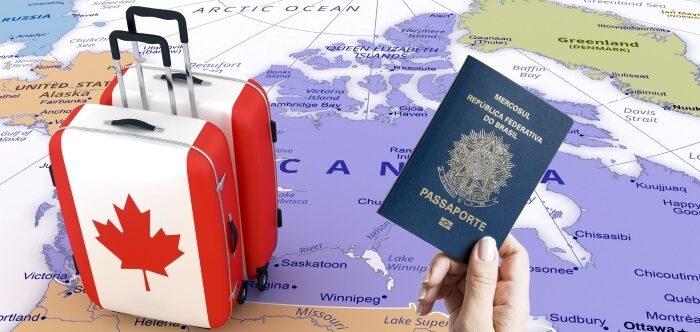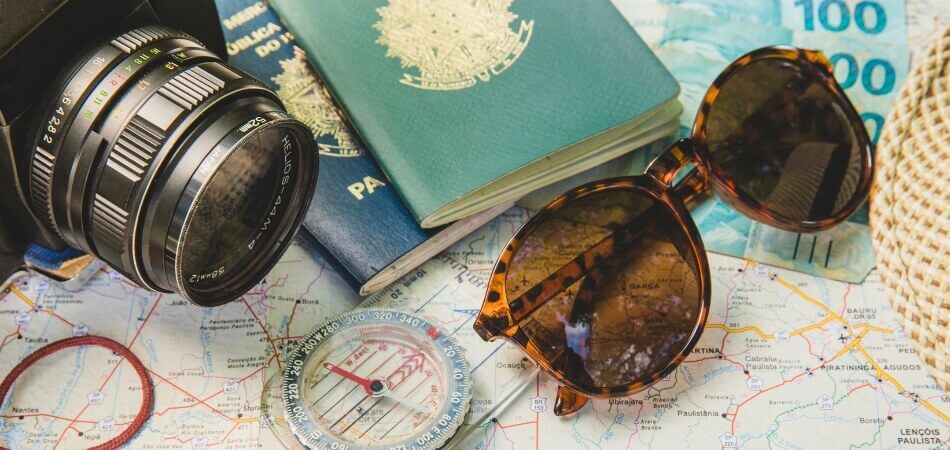Traveling to Canada for a conference can be an enriching experience, offering unique opportunities for networking, learning, and cultural exchange. However, when applying for a conference visa, many applicants wonder, “Is travel history important for a Canada conference visa?”
Yes, a solid travel history shows that you have followed the immigration rules and regulations of countries you have previously visited. This factor can significantly influence the decision on your Canadian visa application, as it reflects your reliability as an international visitor.
To understand more about how your travel history can impact your visa approval and to gain insights into managing the application process, continue reading our detailed article.
A Quick Overview of the Canadian Visa Processing System
The Canadian visa processing system involves several steps that ensure a smooth application process for travelers. Applicants must choose the appropriate visa type, depending on their purpose of visit. Submitting accurate details is crucial, as any discrepancies may cause delays in the process.

Once the visa type is chosen, applicants need to prepare the required documents for Canada conference visa applications or other purposes. These documents include proof of funds, invitation letters, and travel itineraries. Submitting all necessary paperwork helps in avoiding unnecessary delays during the visa assessment phase.
The application is then reviewed by immigration officers who ensure all requirements are met. A decision is typically made within a few weeks. Approved visas are sent directly to applicants, allowing them to proceed with their travel plans.
Is Travel History Important for a Canada Conference Visa?
Yes, travel history is important for a Canada Conference Visa. A strong travel history can positively impact the visa application process. It reflects the applicant’s reliability and adherence to immigration rules in the past. The following are the reasons why traveling history is important for Canada Conference Visas:
Establishes Trustworthiness
A consistent travel history shows that you’ve followed immigration rules in other countries. This reassures Canadian authorities that you are likely to comply. It also reflects a responsible traveler who respects visa conditions. This builds trust, which can positively influence your visa application.
Demonstrates Experience with International Travel
Having a record of international travel indicates you’re familiar with visa processes and border regulations. It shows that you have successfully managed international trips without legal issues. Canadian authorities view this experience favorably during visa consideration. It suggests you’re unlikely to overstay or break Canadian immigration rules.
Helps Assess Your Travel Intentions
Previous travel history helps officials identify your travel purposes and patterns. Frequent short trips suggest you return to your home country as planned. This reduces concerns that you may overstay your visa in Canada. It shows your commitment to following visa regulations.
Highlights Compliance with Visa Conditions
If you’ve followed visa rules in other countries, it strengthens your case. Visa officers look for compliance with entry and exit rules. This ensures you’re a law-abiding traveler who respects visa conditions. It minimizes concerns about potential visa violations.
Supports Proof of Financial Stability
Good travel history often correlates with financial stability, which is essential for visa approval. Frequent international travel suggests you can cover travel expenses. Canadian visa officers look for applicants with the means to support themselves. This adds credibility to your application.
Complements Other Required Documents
While travel history is important, it’s just one factor in your application. Other required documents, like financial proof and invitations, play a key role. Ensure all paperwork, such as the Canada Conference Visa documents, is accurate. A complete application makes for a stronger case overall.
Requirements for the Canadian Conference Visa
Applying for a Canadian Conference Visa involves meeting specific criteria to ensure a smooth entry into Canada for your event. It’s important to understand these requirements to avoid any complications. Here’s a concise breakdown of what you need to know:
- Valid Passport: Applicants must possess a passport with at least six months’ validity beyond their intended stay in Canada.
- Conference Details: Evidence of conference registration and the event’s details are required to confirm the purpose of the visit.
- Financial Proof: Applicants should provide proof of sufficient funds to cover their stay in Canada, ensuring financial independence. This includes meeting the bank balance requirement for Canada visa, which helps demonstrate the ability to support oneself during the trip.
- Travel History: A positive travel history showing compliance with immigration laws in previous visits enhances the application’s credibility.
- Letter of Invitation: If applicable, a letter from the renowned conference organizers inviting the applicant can be a supportive document.
- Accommodation Proof: Documentation confirming where the applicant will stay in Canada is essential, whether it’s a hotel or a host’s address.
- Return Ticket: A return ticket or proof of onward travel is necessary to assure the authorities of the applicant’s intent to leave.
- Medical Examination: In some cases, a medical examination might be required, depending on the applicant’s country of origin or duration of stay.
Adhering to these requirements is crucial for a successful Canadian Conference Visa application. Each point plays a vital role in demonstrating your eligibility and intent, paving the way for a hassle-free experience at the conference.
How to Present all the Required Documents for the Canada Conference Visa?
Presenting the required documents for a Canada Conference Visa is crucial to ensuring your application is processed smoothly. Following an organized and thorough process will help you avoid delays or rejections. Here’s a step-by-step process to help you present all the necessary documents effectively:
Step 1: Organize Your Documents in Advance
Start by gathering all the required documents well before your application submission. Ensure each document is up-to-date and clearly legible. Double-check for expiration dates on passports and other time-sensitive items. Early organization helps avoid last-minute issues.
Step 2: Create a Detailed Checklist
Make a checklist of every document you need, including the passport, financial proof, and conference details. Checking off each item ensures nothing is missed. This helps keep you on track and prevents overlooked requirements. A checklist is a simple yet effective tool to stay organized.
Step 3: Provide Clear and Accurate Copies
Make sure that all the copies of your documents, such as your passport or invitation letter, are clear and legible. Any blurry or unclear copies could delay your application process. Make sure the documents match the originals exactly. Accurate copies help avoid misunderstandings during visa processing.
Step 4: Attach Financial Proof Properly
You must submit financial documents for Canada visa applications to demonstrate that you meet the bank balance requirement. This includes bank statements or financial sponsorship letters. Properly organized financial proof reassures the authorities of your financial independence. Include the most recent and accurate information.
Step 5: Include the Invitation Letter if Applicable
If the conference organizers provided an invitation letter, include it with your application. The letter should state your role and event details clearly. This document supports the purpose of your visit and strengthens your application. Ensure it is signed and dated appropriately.
Step 6: Review and Submit the Application Carefully
Before submitting, thoroughly review all documents to ensure completeness and accuracy. Any mistakes or missing documents can delay the visa process. Check that all forms and details are filled in correctly. Finally, submit everything within the deadlines for a smooth process.
What to Do If You Have No Travel History?
If you have no travel history, you can still successfully apply for a Canadian visa by focusing on other factors. Highlighting your ties to your home country and providing accurate documentation are key. Here are some ways to strengthen your application.
- Highlight Strong Ties to Your Home Country: Emphasize your job, family, or property to prove you plan to return. This shows you are not likely to overstay.
- Provide a Detailed Travel Itinerary: Create a clear itinerary that outlines your travel plans. It reassures officials that you have a structured plan in place.
- Submit Proof of Financial Stability: Provide bank statements or a sponsor letter to demonstrate financial independence. This is crucial in building trust with authorities.
- Obtain a Letter of Invitation: A letter from the event organizers for the upcoming conference in Canada can greatly support your visa application. Ensure the letter is detailed.
- Show Evidence of Professional or Academic Commitments: If you’re employed or studying, submit proof like employer letters or school enrollment. These commitments show ties to your country.
- Use Supporting Documentation: Provide documents such as your property ownership or lease agreements. This further proves you have strong reasons to return home.
- Explain Your Purpose Clearly: Clearly outline why you need the visa and your reason for visiting Canada. Clarity in your purpose strengthens your case.
- Be Honest About Your Lack of Travel History: Don’t hide the fact that this is your first trip abroad. Transparency can positively influence the visa officer’s decision.
FAQs About
Travel history plays a crucial role in determining your eligibility for a Canada Conference Visa. Many applicants have questions about how their travel history impacts the visa process. Below are some frequently asked questions and answers to help clarify its importance.
Will My Travel History Be Verified by Canadian Authorities?
Yes, Canadian authorities will check your travel history to assess your visa application. They may verify your previous travels by reviewing passport stamps, visas, and other travel-related documents to ensure accuracy.
Can I Include Domestic Travel in My Travel History?
Domestic travel within your home country is generally not considered when reviewing international travel history for a visa. Canadian authorities focus on your previous international trips, compliance with immigration laws, and visa regulations.
Does Having a Refused Visa Affect My Current Application?
Yes, a previous visa refusal can affect your current application, but it won’t necessarily lead to rejection. Be transparent about the reason for refusal, and provide explanations if possible to mitigate its impact.
Can a Lack of Travel History Delay My Visa Application?
Not necessarily, but without travel history, Canadian authorities may require additional supporting documents. This could extend the review process, but it won’t automatically delay your application if all other criteria are met.
How Can I Strengthen My Visa Application Without Travel History?
You can strengthen your visa application by emphasizing financial stability, providing a detailed travel itinerary, and showing strong ties to your home country. These factors can compensate for a lack of prior travel experience.
Can I Be Asked for Additional Documents Based on My Travel History?
Yes, visa officers may ask for additional documents like financial proof or employment letters if your travel history raises questions. Providing these documents promptly can help avoid delays in processing your application.
Final Thoughts
The question “Is travel history important for a Canada conference visa?” finds its answer in the integral role that travel history plays in the visa application process.
A well-documented travel history not only enhances the credibility of your application but also demonstrates your compliance with international travel norms. By meticulously preparing and organizing required documents, such as proof of conference registration, financial stability, and a detailed itinerary, applicants can effectively present their case.
Moreover, a clear and honest depiction of past travels, including visas, entry/exit stamps, and even digital records, contributes significantly to a positive assessment by Canadian authorities. Thus, for anyone aspiring to attend a conference in Canada, showcasing a robust travel history is a critical step towards ensuring a successful visa application.







